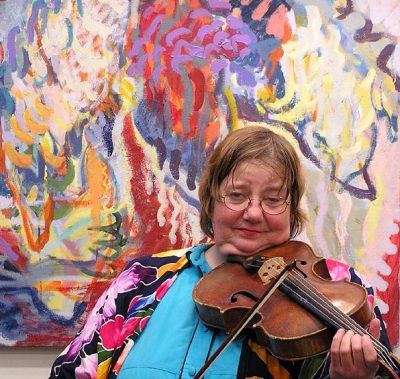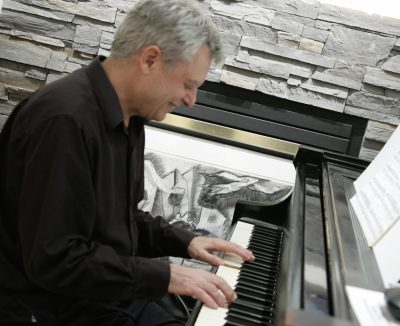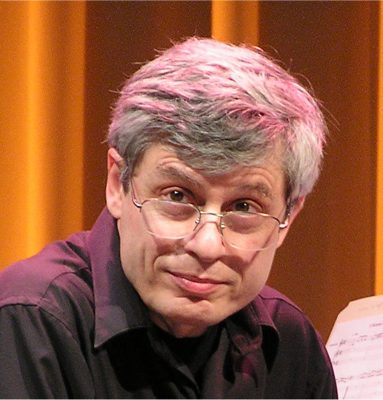Ludwig von Beethoven is probably the most famous figure in musical history to have lost his hearing. Betty Hauck’s story, though less dramatic and less known, is poignant as well. Until six years ago when her debilitating hearing loss derailed her career, Hauck was a successful professional musician on both violin and viola for 50 years. The good news is that three years later, she picked up her beloved instruments again.

Instead of complete chamber music works, Hauck now performs short pieces–easier for a hard-of-hearing musician to handle–and tells her inspirational story in “A Life in Music-Lost & Found: The Legendary Betty Hauck.” Along with her friend and colleague, pianist Carl Banner, founder and executive director of Washington Musica Viva (WMV), that story will be the focal point of “An Evening with Carl & Betty,” on Saturday, Oct. 7 in Takoma Park. The program will feature an eclectic mix of solos, fiddle tunes, Broadway tunes and standards, as well as a Bach selection, with Banner accompanying Hauck on some pieces.
The event is a reunion of sorts. After meeting Carl and his wife, Marilyn, an artist, in 2000, Hauck performed several WMV concerts.
Hauck started playing violin as a fourth-grader in public school, which at the time, offered rich music programs. “If not for public school, I doubt I would have gotten into music,” said the Boston-area native.
A military brat, Hauck was used to frequent moves, which may contribute to her varied and peripatetic music career. “While still in high school, I practiced two to three hours a day, advanced rapidly, and played principal viola with the Boston Youth Orchestra,” she said. “I joined the musicians’ union when I was 15 or 16; my viola teacher was a music contractor, who hired me to play some gigs.” In high school, she also switched to viola.

After graduation, Hauck lived in New York City and spent a school year at the Manhattan School of Music. She went on to study music at Brandeis University, taught Suzuki violin to third-graders in rural New Hampshire and earned a master’s degree in music at the New England Conservatory in Boston.
A founding member of the Apple Hill Chamber Music Players and resident violist at the Apple Hill Center for Chamber Music, which she described as “a kind of musicians’ commune,” Hauck lived in New Hampshire for 25 years.
Hauck’s illustrious career included performances at venues including Carnegie Hall, Lincoln Center, Tanglewood and Aspen. Among the highlights to date have been playing with cellist Yo-Yo Ma, in the orchestra for the Broadway musical, “I Do! I Do!”, in Peter Sellars’ opera productions and with the Mark Morris Dance Company. Pulitzer Prize-winning composers Jon Deak and John Harbison wrote music for her.
Musically, Hauck was sitting on top of the world–until about 15 years ago when she began to develop gradual, age-related, sensorineural hearing loss. At first, she had trouble hearing people’s speech. It became difficult for her to play, even with hearing aids.
“It was a difficult (situation) to face for a musician,” Hauck said. “And there was nothing to correct it. People suggested I keep playing for fun, but I didn’t play for fun. I wasn’t able to hear well enough to do what I had been doing on the same level.”

Six years ago, at age 65, Hauck “completely turned her back” on music. But three years later, when a friend took a terrible fall, Hauck and Carl Banner put together a mini-concert to cheer him. The mini-concert yielded another benefit: it made Hauck realize that under certain circumstances, she could still play.
Hauck knew someone who worked at an adult day-care center and went to play–fiddle tunes, show tunes, and some Bach–on violin and viola. She became involved with events the Hearing Loss Association of America sponsored.
Knowing that every year hearing loss tends to diminish, Hauck started auditory training. She also read about a woman who presents a one-person show about her hearing loss. “One point she made is that you can get over the loss, but that first, you have to grieve,” Hauck said. “This led me back. I started going through the grieving process.”
It’s an ongoing process in which you “sometimes see the sweetness on the other side,” she continued. “I realized I could play for special audiences. I could help bring people back to the enjoyment of music. I could still do something in music, despite the disability. I could be an advocate and educator.”
Things are improving for the hard-of-hearing. The FDA is in the process of approving over-the-counter hearing aids, which would cost a lot less than conventional ones, and when hearing loss reaches a certain point, cochlear implants are possible. One way or another, Hauck intends to stay on the musical circuit.
“An Evening with Carl & Betty” is set for 7:30 p.m. Saturday, Oct. 7, at BannerArts, 7502 Flower Ave, Takoma Park. Tickets are $15, in advance only. Call 301-891-6844 or visit www. dcmusicaviva.org. View this event on CultureSpotMC here.